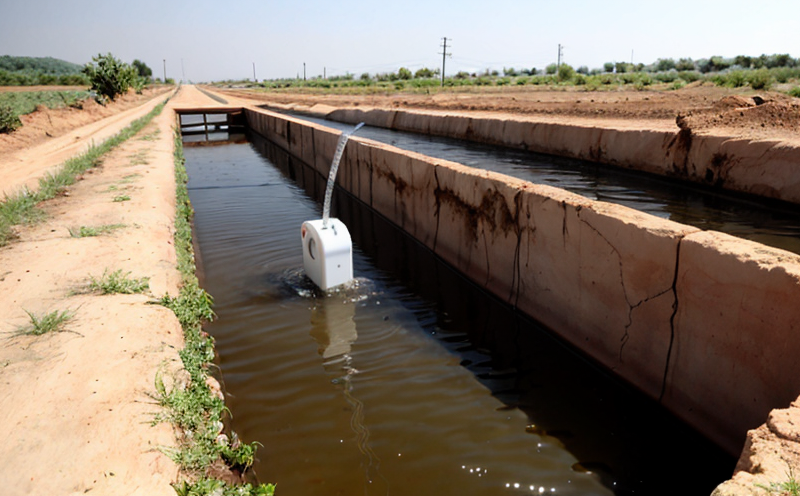EN 12506 Sulfate in Water Testing
The European Standard EN 12506 specifies a method for determining sulfate content in water samples. This standard is crucial for ensuring the quality and compliance of water used across various sectors, including mining, environmental monitoring, and public health. In the context of mining operations, the presence of high levels of sulfate can lead to significant issues such as increased wear on machinery, corrosion of pipelines, and the formation of gypsum, which can clog filters and pumps.
The standard provides a standardized approach for sampling, preparation, and analysis that ensures accurate measurement. The methodology outlined in EN 12506 is designed to be robust yet flexible enough to accommodate different sample types and environmental conditions commonly encountered in mining operations. This service plays a critical role in ensuring the integrity of water used both within mines and for local communities.
The process begins with proper sampling techniques, which are essential to ensure that the representative nature of the sample is preserved. The sample must then be appropriately prepared according to EN 12506 guidelines before undergoing analysis using ion chromatography or other suitable analytical methods. It is imperative to follow these steps meticulously to avoid any bias in results.
The significance of this service extends beyond mere compliance; it contributes significantly to operational efficiency and environmental stewardship. By accurately identifying sulfate levels, mining companies can take proactive measures to mitigate risks associated with high sulfate concentrations. This includes optimizing water treatment processes, selecting appropriate materials for infrastructure, and implementing strategies to minimize environmental impact.
Furthermore, adhering to international standards like EN 12506 helps companies maintain a consistent quality standard across different locations and operations. This consistency is vital in maintaining trust with stakeholders such as regulatory bodies, customers, and the general public. The use of such recognized standards also facilitates smoother international trade by ensuring compatibility with global regulations.
To summarize, EN 12506 sulfate testing is more than just a compliance requirement; it is an integral part of responsible mining practices that contribute to operational excellence and sustainable development. By leveraging this service, organizations not only meet regulatory requirements but also enhance their reputation as leaders in environmental responsibility and safety.
Why It Matters
The importance of accurate sulfate testing cannot be overstated, especially within the mining industry where water quality directly impacts operational efficiency and environmental health. Sulfate levels above certain thresholds can lead to accelerated corrosion rates, increased maintenance costs, and potential damage to equipment and infrastructure.
In addition to its role in preserving machinery integrity, monitoring sulfate levels is critical for maintaining compliance with local and international regulations. Mining companies are increasingly under pressure to demonstrate their commitment to sustainable practices, which includes ensuring that all processes adhere to stringent quality control standards. This testing ensures that any deviations from acceptable limits can be identified promptly, allowing for corrective actions to be taken.
The environmental impact of excessive sulfate levels cannot be overlooked either. High concentrations can disrupt local ecosystems by altering pH balances and affecting flora and fauna. By adhering to EN 12506 standards, mining operations contribute positively towards preserving natural habitats and promoting biodiversity.
From an economic perspective, proactive management of water quality through regular testing helps avoid costly disruptions caused by unexpected failures or breakdowns due to sulfate-induced corrosion. Early detection allows for targeted interventions, thereby reducing downtime and associated expenses. Additionally, maintaining good relations with nearby communities who depend on the same sources of water is enhanced when clear evidence shows adherence to best practices.
In conclusion, implementing EN 12506 sulfate testing goes beyond regulatory compliance; it underscores a company's dedication to excellence in operational performance and environmental responsibility. It serves as both a safeguard against potential risks and an opportunity for continuous improvement towards achieving sustainable goals.
Scope and Methodology
| Step | Description | Methodology |
|---|---|---|
| Sampling | Collecting representative water samples from specified points within the mine. | Ensure the sample reflects actual conditions and is not contaminated during collection. |
| Preparation | Precisely measure and prepare the collected samples according to EN 12506 specifications. | Use appropriate dilution factors if necessary, ensuring all components are well-mixed. |
| Analytical Techniques | Determine sulfate content using ion chromatography or other suitable methods. | Follow the precise protocols outlined in EN 12506 for accurate measurement and reporting. |
| Data Analysis | Evaluate results against established limits set by relevant regulatory bodies. | Compare findings with historical data to identify trends or anomalies. |
| Reporting | Compile detailed reports summarizing all aspects of the testing process and results. | Incorporate recommendations for any necessary adjustments based on findings. |
International Acceptance and Recognition
The European Standard EN 12506 has gained widespread acceptance not only within the European Union but also internationally. Its rigorous methodologies have earned it recognition from various national standards organizations, including ASTM and ISO.
Mining companies that adopt EN 12506 benefit from a consistent approach to sulfate testing across different geographical regions. This standardization facilitates seamless international collaboration and trade by ensuring uniform quality benchmarks are met everywhere. It also enhances credibility among stakeholders such as investors, regulatory authorities, and local communities.
The adoption of this standard goes beyond mere compliance; it represents an industry-wide commitment to excellence in water quality management. By aligning with internationally recognized standards like EN 12506, mining operations demonstrate their leadership in environmental responsibility and operational efficiency. This alignment fosters trust and confidence among all parties involved.
In conclusion, the international acceptance of EN 12506 underscores its importance as a benchmark for sulfate testing within the mining sector. It not only ensures compliance with local regulations but also promotes best practices globally, contributing to sustainable development efforts worldwide.





